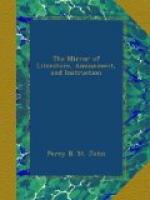royal establishment; and it is never without a jester,
who enjoys an extraordinary latitude of speech, and,
both in his dress and manner, assumes the habit and
appearance of folly. It is usual to laugh at
the witticisms of these jesters, even when they are
the most severe; and the sovereign himself respects
their privilege. The tribe to which Kerreem Khan
belonged, speak a language which, from its rudeness,
is denominated “the barbarous dialect.”
As this prince was one day sitting in public, he commanded
his jester to go and bring him word what a dog, that
was barking very loud, wanted. The courtiers smiled
at this sally of their monarch. The jester went,
and, after appearing to listen for some time with
profound attention, returned, and said, with a grave
air, “Your majesty must send one of the chief
officers of your own family to report what that gentleman
says: he speaks no language except “the
barbarous dialect,” with which they are familiar,
but of which I do not understand one word.”
The good-humoured monarch laughed heartily at this
jest, and gave the wit a present. This anecdote,
to which many similar might be added, shows that there
is little difference between the office of jester at
the modern court of Persia, and that which some centuries
ago existed at every court in Europe. A resemblance
even in trifling forms merits attention, as it may
lead to conclusions on the progress of knowledge and
the condition of society; and from the character of
their amusements, we may perhaps judge as correctly
as from their more serious occupations, of the degree
of civilization which a people has attained.
In the court there is always a person who bears the
name of “story-teller to his majesty;”
and the duties of his office require a man of no mean
acquirements. Though passionately fond of public
exhibitions, the Persians have none that deserve the
name of theatrical entertainments; but though strangers
to the regular drama, their stories are often dramatic;
and those whose occupation is to tell them, sometimes
display so extraordinary a skill, and such varied powers,
that we can hardly believe, while we look on their
altered countenances and listen to their changed tones,
that it is the same person, who at one moment tells
a plain narrative in his natural voice, then speaks
in the hoarse and angry tone of offended authority,
and next subdues the passions he has excited by the
softest sounds of feminine tenderness. The art
of relating stories is attended both with profit and
reputation. Great numbers attempt it, but few
succeed.
The person whose office it is to amuse his majesty with these stories is always in attendance. It is equally his duty to beguile the fatigue of a long march, and to soothe the mind when disturbed by the toils of public affairs; and his tales are artfully made to suit the disposition and momentary humour of the monarch. Sometimes he recites a story of the genii; at others he speaks of the warlike deeds




